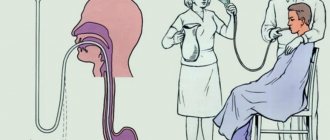Stomach pain and diarrhea are caused by various factors. The disease depends on the frequency and intensity of pain, on their nature. Diarrhea is caused by a lack of essential digestive enzymes in the body.
To determine the diagnosis, patients are referred for tests. We advise you to use the diagnostic services of the private medical clinic “KDS Clinic”. Specialists will conduct an initial consultation and examinations that will help diagnose diseases in the early stages. All examinations are carried out using modern equipment. The clinic's experts are ready to help you at any time.
Possible causes of pain
Provoking factors are diseases of the digestive system:
- Inflammatory processes - gastritis, colitis, enteritis, ulcers.
- Infections of viral and bacterial origin – adenovirus, rotavirus, salmonellosis, toxic infections.
- Dysbiosis.
- Helminthic infestations.
- Intolerance to certain food groups.
- Oncopathology.
Stomach pain and loose stools may be a symptom of enzyme deficiency , which makes it difficult to digest food. The condition is accompanied by pathologies such as pancreatitis, bile stasis, lactase deficiency.
An attack of diarrhea, accompanied by nausea and epigastric discomfort, develops against the background of overeating or excessive consumption of fatty, fried foods.
Diarrhea, combined with sharp cutting pain in the lower gastrointestinal tract (intestinal colic), is formed against the background of a bacterial or viral infection. Typical for the condition:
- General weakness.
- Increased body temperature.
- Rumbling in the intestines.
- Vomiting (not excluded).
- Change in color and consistency of stool - from brown it turns green, becomes watery, smelly, and may contain mucous inclusions.
Foodborne toxic infections are another cause of diarrhea and stomach and abdominal pain. Signs of poisoning include:
- Nausea ending in vomiting.
- Loose stools.
- Cramping spasms of different parts of the intestines.
- General intoxication of the body - fever, weakness, headaches.
Regardless of the triggering factors, the pathology is accompanied by active gas formation, bloating, aching (sometimes sharp or dull) pain, and diarrhea. Undigested food fragments are clearly visible in the stool.
Video: Why does diarrhea happen?
In some cases, intestinal upset occurs due to severe stimulation of the nervous system or diabetes.
In addition to diarrhea and pain, the condition may be accompanied by other symptoms. Signs indicate the development of a pathology, and not a short-term intestinal disorder:
- General weakness.
- Heartburn, belching after eating.
- Nausea, heaviness in the stomach.
Why does body poisoning occur?
The reasons are directly related to non-compliance with hygiene rules. It is caused by improper processing of consumed foods.
Diarrhea can be caused by:
- Not completely purified water;
- eat unwashed tomatoes, cucumbers, apples, pears;
- the diet includes too fatty foods;
- diets and fasting;
- severe stress caused by emotional overstrain;
- combination of incompatible components;
- expired products;
- abuse of foods not accepted by the body.
Pathologies that cause diarrhea:
- infectious disease caused by rotaviruses;
- infectious diseases of the gastrointestinal tract;
- internal bleeding;
- obstruction in the gallbladder;
- lack of vital enzymes;
- Crohn's disease;
- colds;
- chronic diseases;
- metabolic disorders.
A terrible outcome: the cause of the disease can be cholera caused by an intestinal infection.
Cholera disease
Accurate diagnosis of the disease
Acute diarrhea is accompanied by rapid loss of fluid and electrolytes needed by the body. Therefore, during a physical examination of the patient, the doctor diagnoses signs of dehydration. It could be:
- Decreased skin turgor.
- Tachycardia.
- Hypotension.
To identify the cause of the condition, the patient is prescribed the following procedures and tests:
- Proctological examination. The presence of anal fissures, fistulas, and signs of paraproctitis allow the physician to suspect the presence of Crohn's disease.
- Instrumental techniques, in particular colonoscopy and gastroscopy. Used to examine the mucous membranes of the upper gastrointestinal tract and large intestine.
- Coprogram - study of feces.
- Test for worm eggs.
- Bac sowing.
- Ultrasound of the abdominal organs to diagnose inflammation of the digestive tract and other abnormalities.
- Measuring intestinal pH levels.
- General, extended blood test.
Preventive measures
If a person has severe stomach pain and periodic diarrhea, he needs to take some preventive measures to prevent the development of such symptoms. Experts include:
- Mandatory hand washing before every meal. Using antibacterial soap or other hygiene products.
- Washing fruits, herbs and vegetables before eating and preparing food.
- Drink only clean water that is not found in open sources.
- Checking the expiration date of food products.
- Exclusion from the diet that does not inspire confidence (street fast food, ready-made salads from markets, etc.).
By adhering to the above precautions, a person’s chance of developing stomach problems will be significantly reduced.
When diarrhea occurs and stomach pain occurs, these symptoms should never be ignored. A sick person should go to a medical facility and not look for a solution to the problem on their own. Even just having your urine and blood tested will help determine the source of the problem. This is due to the fact that in some cases the causes of the disease are quite serious and can even cause death if not promptly contacted by medical professionals.
When medical attention is needed
If the stomach continues to hurt and the diarrhea does not stop within 3 days, the patient is advised to get medical help. Alarming symptoms that require immediate hospitalization of a person are:
- Increased dehydration due to persistent diarrhea. Signs: dry mucous membranes, unquenchable thirst, severe weakness. As well as a drop in blood pressure, a decrease in urine output, swelling, and convulsions.
- Bloody stools, vomit in the form of “coffee grounds”.
- Violations of visual and respiratory functions.
- A rise in body temperature above 39 degrees, accompanied by severe chills.
- The appearance of jaundice.
Associated symptoms of stomach pain
In addition to painful sensations, there may be heaviness and pain in the stomach. The person feels weak. Sometimes vomiting is present. Abdominal pain is often complicated by diarrhea. In this case, it is not the diarrhea that should be treated, but the cause that caused it. If diarrhea continues for one or even two weeks, then it is acute diarrhea. Over a longer period of time, the disease enters the chronic stage.










